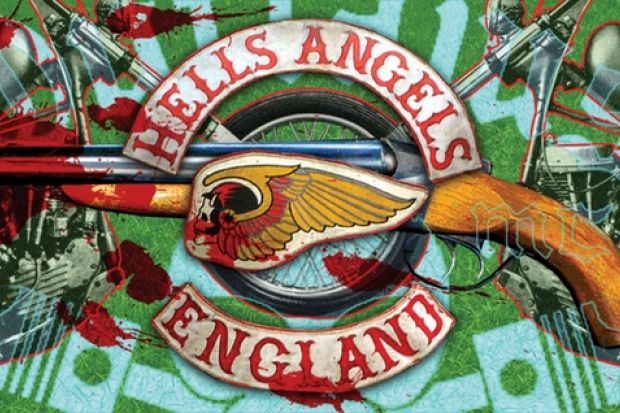Gerry Tobin was a Hell's Angel. He was on the M40, riding back from the Bulldog Bash, when he was gunned down by two men in 2007 (Real Crime with Mark Austin: Fallen Angel, ITV1, Monday 21 November, 10.35pm). The date was the 12th of August, the start of the shooting season. As Gerry was blasted into the air, his Harley-Davidson carried on for 200 yards before sprawling, like its rider, on the tarmac. A man in a striped T-shirt managed to make the ensuing traffic jam sound like a holiday. "People just kicked back and relaxed. They chatted. They got out of their cars and took their dogs for a walk."
He didn't say if they noticed Gerry's fellow Angels cutting the patch from his jacket. This much-coveted piece of cloth covers 1 per cent of the colours and signifies that while 99 per cent of bikers are law-abiding, the remainder are not. The Angels regard the patch as belonging to the chapter rather than the individual, and that's why they removed it from the dying man. Julian Sher, an expert on motorcycle gangs, said that Hell's Angels may seem like "lovable rogues", but it is not advisable to cross them. He didn't elaborate. He didn't need to.
The man who led the investigation into the murder, Detective Superintendent Ken Lawrence, was inexplicably interviewed in a disused public toilet. The cracked urinals, white tiles and cubicle doors hanging off their hinges were a constant distraction. Perhaps that's why he was moved to a bridge above the M40. "Gerry would have passed under this bridge one minute before he was shot," said Ken. A dramatic reconstruction showed several men in a green Rover draw level to Gerry, salivating at the imminent kill.
At first it looked as if the police faced an impossible task. The Angels' code of silence meant that they wouldn't even open their mouths to identify Gerry's body. "We had to get his name from his wallet," said a policeman. Then there was a breakthrough. The burnt-out Rover was found in a back-street in Coventry and traced to its owner, one Sean Creighton. Using his own car for the killing wasn't the only mistake Sean made. He and his accomplices were caught on CCTV cameras at a petrol station wearing winter clothing in an attempt to disguise themselves. It only made them stand out. The same cameras caught Gerry, too. He was looking up and smiling. You couldn't imagine Sean doing that. Or any of his friends. It would be hard to imagine a more intimidating bunch. Mute, tattooed, thick-set and expressionless. One did manage to exercise his facial muscles in court sufficiently to jeer at Gerry's mum, who had come over from Canada. She described going to the morgue, the white sheet over her son and how she sang to him. "I told Death you can't have him, he's mine, he's coming back with me."
Gerry's killers belonged to an organisation called the Outlaws, a rival group to the Hell's Angels. They were involved in a territorial dispute over a field outside Stratford-upon-Avon. The Outlaws believed that the Angels were trespassing when they held their "bash" there. In revenge, they murdered a man they didn't even know. Shakespeare could probably have written a play about it, but no poetry could compensate Gerry's mum for her loss.
This is how it is in parts of Britain. A society within a society. Yet those men standing in the dock, who showed not one flicker of remorse for what they had done, reflect in their distorted humanity the brutality and callousness of contemporary capitalism. We did not learn very much about their backgrounds, but it was probable that they didn't grow up in nice houses or attend good schools or go to university. And who knows whether they were loved or whether such feelings were bashed out of them at an early age.
Education can't repair damage like that, but the arts especially have a role to play in making us value our common humanity. Literature is abolished in George Orwell's Nineteen Eighty-Four precisely because it offers the chance to empathise, to think and feel differently, even the chance to find your own voice. The beauty of the arts is that they keep before us, in a non-prescriptive way, the idea that humans are not resources to be exploited but beings to be developed. If we lose sight of that simple but profound truth, as we are in danger of doing, then the barbarism of men like Sean Creighton may one day engulf us all.
That's Britain! (BBC One, Wednesday 23 November, 8pm) is one sign that it may be already too late. "What irritates you?" chirped presenters Nick Knowles and Julia Bradbury. "You do," is my answer.
Register to continue
Why register?
- Registration is free and only takes a moment
- Once registered, you can read 3 articles a month
- Sign up for our newsletter
Subscribe
Or subscribe for unlimited access to:
- Unlimited access to news, views, insights & reviews
- Digital editions
- Digital access to THE’s university and college rankings analysis
Already registered or a current subscriber? Login
